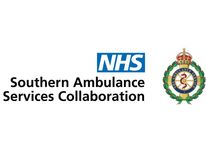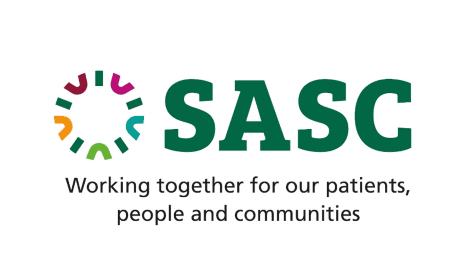Southern Ambulance Services Collaboration (SASC)
Southern Ambulance Services Collaboration (SASC)
The Southern Ambulance Services Collaboration (SASC) brings together five ambulance trusts from the south of England.

Introduction
The Collaboration will enable us to support each other more effectively, share best practice, and further our working together to provide high quality resilient care to our patients at the best value.
The Southern Ambulance Services Collaboration (SASC) brings together:
- East of England Ambulance Service NHS Trust (EEAST)
- London Ambulance Service NHS Trust (LAS)
- South Central Ambulance Service NHS Foundation Trust (SCAS)
- South East Coast Ambulance Service NHS Foundation Trust (SECAmb)
- South Western Ambulance Service NHS Foundation Trust (SWAST)

The Collaboration is being formed in the context of a challenging operational and financial environment. Our five organisations are ambitious to improve the care and services that we provide to our patients and communities. We have been increasingly working together to make these improvements and have identified that now is the right time to formalise our collaboration as many other NHS providers have done.
The initiatives for the Collaboration will be co-produced by our staff working closely together and will enable us to support each other more effectively, share best practice, and work together to provide high quality resilient care at the best value.
SASC launched in May 2024, and further developments will be published here as they happen.
Frequently asked questions
1. Why are you collaborating and why now?
The chief executives of the five southern ambulance services recognise the value in working together and are establishing the Southern Ambulance Services Collaboration to work collectively to solve some of the biggest challenges the NHS has faced. The challenges faced include evolving patient demand, a constrained financial environment and ongoing recruitment and retention issues. Additionally, the complexity of patient demand is resulting in a framework that encourages specialism in services and reconfiguration of hospitals and primary care services. More than ever there are multiple pathways of care for patients, and ambulance services must respond to these in different ways.
The NHS relies on collaboration between organisations. All ambulance trusts in England work together, on a range of topics at different times. Some of this is through NHS England and some is through the Association of Ambulance Chief Executives (AACE). Following the pandemic and building on lessons learnt, NHS England provided guidance on the role that provider collaboratives can play in delivering better care. Most acute and mental health providers are in at least one collaborative and have delivered benefits for patients that would not have been delivered by working alone.
The five chief executives have identified that now is the right time to formalise how we work together to respond to these shared challenges and deliver the best possible care to patients, whilst operating in a constrained financial climate.
2. Will Trusts be required to join every initiative in the Collaboration?
No, each Trust will choose whether to join any particular initiative.
3. What does it mean for me as a staff member? What does this mean for me as a patient?
The initiatives of the Collaboration will focus on improving patient care and supporting staff in the delivery of our services.
As staff:
The Collaboration will create opportunities for staff to input on the development of initiatives across ambulance trust borders. As is typical of projects, we will be engaging with staff to seek their views and input and there will be regular communication through individual Trust communication routes and via a Southern Ambulance Services Collaboration website.
We will be seeking to improve the way we do things in all areas of our operations. Changes to working practices may arise from learning from others, sharing our own best practices and working with colleagues in other Trusts to co-design solutions to the challenges we face.
There also may be opportunities to work in other services, either as operational staff members or as part of a Collaboration project.
As patients:
We are determined and committed to improving our services for patients, whether through increased resilience or through assessing our current working practices to find the best solutions to your varied needs. When the opportunity arises, we will actively involve patient representatives in the change process.
4. What do you think will be the benefits, and when do you think you will see them?
Whilst the specifics of the benefits are not yet finalised, we expect that through effective collaboration the benefits for patients and staff will emerge in all areas of our work. Some projects will be designed to deliver early benefits, whilst other projects will take longer to deliver and realise the full benefits.
Current ideas for driving progress include: shared procurement to reduce costs, harnessing technology and AI to improve our services and care, identifying where we can learn from each other (particularly in the 999 operations and contact centre environments), training and education, and staff well-being.
5. Is this about saving money or improving services?
The core purpose of the Collaboration is to improve the care we provide to our patients, while exploring opportunities to do this at a lower cost.
6. How is this being funded?
To establish the Collaboration and fund a small Collaboration team, each Trust has made a small contribution. We have learned from other collaborations that if we don’t have a small team to drive initiatives forward then we are unlikely to realise the benefits.
7. Why these five?
The five southern ambulance services share boundaries and similar challenges and the Boards and Executive teams are “like minded” in their desire to improve services for people across the south of England. All are now in a position where they are in the process of transforming their services and setting out a new strategic direction to deal with their respective challenges.
The northern ambulance trusts already collaborate under the Northern Ambulance Alliance.
SCAS will represent the Isle of Wight Ambulance Service and ensure that they are included in relevant discussions and updated through regular communications.
8. What examples of best practice does each Trust have?
One of the first pieces of work will be to identify which Trusts perform certain functions particularly well and where shared learning can make a real difference to the care we provide and to our staff’s working lives. There is not always “one right answer” and we will recognise this in our discussions, particularly when we are developing initiatives and scoping projects.
